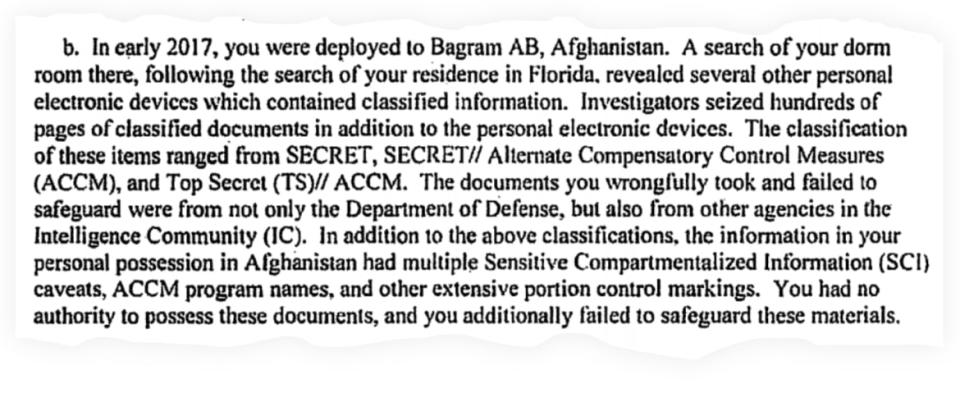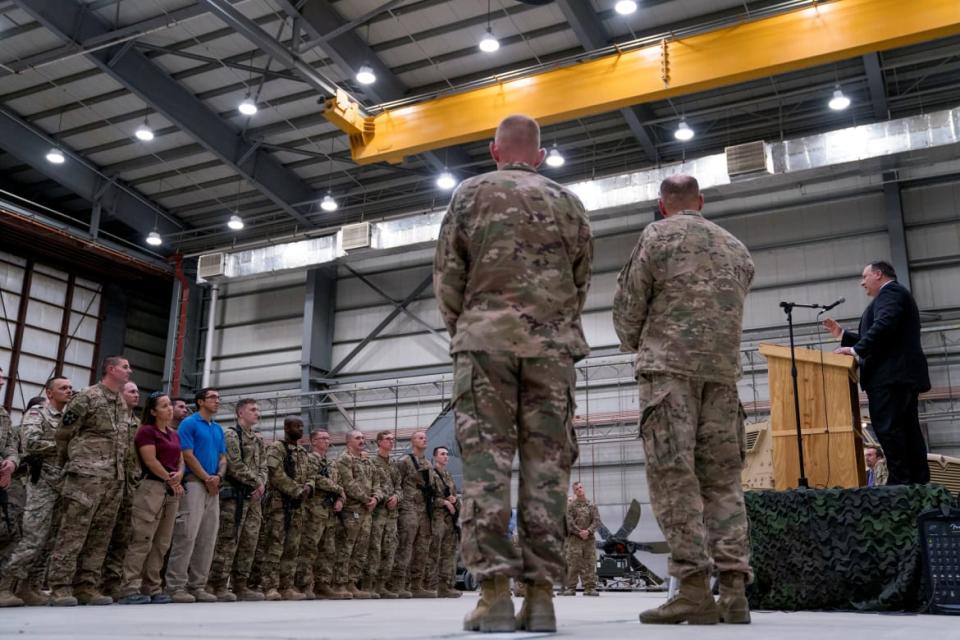Ex-Intel Boss Stole Top Secret Docs for at Least a DECADE, Air Force Says

A retired U.S. Air Force intelligence officer who admitted earlier this year to keeping hundreds of highly classified government documents at his Florida home had been pilfering confidential material for at least 10 years, according to military records reviewed by The Daily Beast.
Long before Lt. Col. Robert Birchum pleaded guilty in federal court to one felony count of unlawful retention of national defense information, he received a searing USAF letter of reprimand describing the conduct for which he would later be charged as “disgraceful,” “inexcusable,” “irresponsible,” and “despicable.”
The letter, which is dated Jan. 5, 2018 and signed by Brig. Gen. Darren V. James, provides new insight into the details of Birchum’s alarming hoard, dating back to a posting the Eagle Pass, Texas native assumed about 12 years after joining the service in 1986. The documents Birchum “wrongfully took” were not only from the Department of Defense, but from “other agencies in the Intelligence Community (IC) as well,” the letter states.
Although the materials mishandled by Birchum, 54, date back some 25 years, prosecutors said in a sentencing memo filed Friday that “the government cannot identify precisely when the Defendant removed these classified documents from his secure workplaces.” However, according to the filing, “it is likely that he did so over the course of more than a decade.”
In the reprimand letter, which was attached to the sentencing memo, James wrote, “In 1998 as a First Lieutenant assigned to Beale AFB, you were responsible for collection of time sensitive U-2 derived intelligence and you also represented 12th Air Force in U-2 mission planning issues at joint AF and other IC exercises. The classified information found at your home included U-2 data that was developed during this time frame. You had no authority to possess these documents, and you additionally failed to safeguard these materials.”
The U-2 spy plane is used for high-altitude reconnaissance, and was developed jointly by the Air Force and the CIA.
In addition, investigators with the Air Force Office of Special Investigations (AFOSI) found materials developed in 2000, while Birchum, then a captain, oversaw “near real time U-2 derived imagery and signals intelligence collection, exploitation, and dissemination,” the letter goes on. There were also secrets from Birchum’s 2001 to 2003 stint as Chief of Air Force Intelligence, Surveillance and Reconnaissance (ISR) Readiness that AFOSI found in his home, as well as classified ISR documents from 2003-2004, when Birchum was assigned to the Pentagon, according to the letter.
In their sentencing memo, prosecutors said that Birchum’s lackadaisical handling of the secrets was “equally troubling.”
“[T]he Defendant made no effort to safeguard or limit others’ access to this classified material after having removed it unlawfully—he kept both paper documents and electronic information in unsecured locations and on non-password-protected devices where others could (and did) access it,” they wrote. (One of these people was Birchum’s wife, according to prosecutors.)
It is unclear what prompted the criminal case against Birchum all these years later. In an email, Birchum’s attorney, Eric Roper, told The Daily Beast that the judge in the case asked that same question in court on Monday. However, he said: “rather than try to paraphrase the responses, I would have to refer you to the transcript”— which is not yet publicly available.

The list of Birchum’s wrongs takes up an entire page of the four-page reprimand letter, continuing through the highly-decorated officer’s subsequent postings to the USAF Combat Intelligence Division, the United States Special Operations Command (USCCOC), the Office of the Director of National Intelligence (ODNI), and his final days at Tampa’s MacDill Air Force Base. Classified materials from each of these assignments were discovered in Birchum’s house, the letter said. As a lieutenant colonel attached to ODNI, Birchum’s access to the nation’s most sensitive secrets included insights into “various DoD and other sensitive special operations missions, and intelligence pertaining to unconventional warfare operations,” the letter pointed out.
Birchum attracted AFOSI’s attention in Jan. 2017, around the time he deployed to Afghanistan, according to the letter. Acting on a tip, investigators searched Birchum’s home in Tampa, along with his dorm room at Bagram Air Base, and seized multiple electronic devices containing classified information, the letter states. Several months after he returned home, Birchum was caught on base with a loaded gun and 100 official Air Force Polaroid photos in his backpack, states the sentencing memo, which includes a second letter of reprimand barring Birchum from the base for three years.
Some of the classified items Birchum “deliberately removed from secure locations,” prosecutors said in their sentencing memo, were “designated as ACCM,” or “Alternative Compensatory Control Measures.” That is, “especially sensitive information that requires even greater protection than TS/SCI.”
“Your failure to properly safeguard Secret and TS information is irresponsible and causes me to question your judgment,” Brig. Gen. James wrote. “Your actions are disgraceful and have potentially seriously compromised national security. You have also compromised your integrity and character as an officer… You have engaged in an inexcusable manner that is not only irresponsible, but blatantly disregards our Service values: Your despicable actions reflect poorly on yourself. This type of behavior will not be tolerated, and these actions seriously bring into question your ability to serve as an officer in the U.S. Air Force.”
Still, Birchum insisted that the AFOSI investigators had it all wrong, claiming he had once “accidentally packed classified information” when transferring out of JSOC, and had just one other minor incident in 2004.
“I have taken countless trainings on handling classified information and always applied safeguards necessary to handle it,” Birchum wrote in a sworn statement dated Jan. 30, 2017. “... I do not know if there may have been classified information in my residence, but I am reasonably sure that during my travels I protected all classified information I traveled with.”

Former Secretary of State Mike Pompeo speaks to coalition forces at Bagram Air Base, where Birchum was stationed on his final overseas deployment.
In an Apr. 13 letter to Judge Kathryn Kimball Mizelle, Birchum’s wife Cristina, a civilian intelligence analyst for the U.S. government, said the couple met in July 2001, when they were both working at the Pentagon. The two survived the 9/11 terror attack on the compound, and “live with that trauma daily,” her letter said, calling Birchum “a shell of the person” she once knew. In the summer of 2008, Cristina’s letter says, her husband began “experiencing nightmares, crawling on the floor in the middle of the night.”
She and others, including friends, family members, and colleagues, described Birchum as deeply traumatized from childhood abuse. The troubles compounded as a teen, when Birchum, who was then known by his given name Roberto Lorenzo Rodriguez, “was subjected to bullying and physical attacks based on his perceived status of not being of true Hispanic origin in a dominantly Hispanic community,” his lawyer said in a May 9 court filing.
Birchum has seen teammates killed in combat, which led to PTSD, anxiety, and major depressive disorder, according to Air Force doctors, whose reports were filed in court by Roper, Birchum’s lawyer.
Birchum has been hospitalized numerous times for suicidal ideation (with two actual attempts), according to the reports, which say Birchum, who also has anger management issues, has not been willing to commit to a therapy regimen and often stops taking his prescribed medication. To cope, he instead turned to alcohol, according to the Air Force.
The charge to which Birchum pleaded guilty in January carries up to 10 years in prison. Roper on Monday asked the judge for a sentence of probation and a fine.
“Sadly, like too many of our brave service men and women, Mr. Birchum returned from war with the debilitating scars of his experiences overseas,” Roper wrote in the May 9 filing.
“Mr. Birchum fortunately now receives specialized care from the Veteran’s Administration for his service-connected disabilities but continues to struggle with the impact of his service on a daily basis,” the filing continues. “Mr. Birchum recognizes that his record of prior service is in no way an excuse for his current situation and he does not offer it to justify the extremely poor care and attention paid to his responsibilities that led him to be before the Court to be sentenced.”
Prosecutors, on the other hand, asked the judge for 6.5 years incarceration, and a fine of at least $25,000, citing the April arrest of 21-year-old National Guard airman Jack Teixeira.
“Numerous recent cases highlight the importance of deterring the mishandling of classified information,” the government’s sentencing memo argues. “...As the Supreme Court has recognized, ‘no governmental interest is more compelling than the security of the Nation.’”
Birchum, prosecutors add, “was a highly trained professional who abused his professional privileges and special access” and “put the national security of the United States at great risk over a period of many years.”
In short, the prosecution argued, Birchum “betrayed the military’s trust in him again and again.”
Through it all, one mystery remains. Birchum’s motive is still unclear, and prosecutors say that “unlike most white-collar criminals, [Birchum] did not appear to have a financial motive to remove and hoard the classified NDI.”
For his part, Roper, who responded to The Daily Beast’s request for comment on Monday but said he was too busy for an interview, argued in his most recent court filing that there “is no indication” Birchum had any nefarious intent. Rather, according to Roper, Birchum simply “demonstrated exceptionally poor adherence” to the rules.
Roper requested Birchum’s criminal conduct “be considered in the context of his prior service to his country, his lack of any malicious intent, and his sincere remorse and commitment to his continued rehabilitation and treatment.”
Air Force spokeswoman Capt. Rachel Salpietra previously told The Daily Beast that official policy precluded the service branch from commenting.
Birchum remains free on a personal recognizance bond. Both sides now have a week to submit further arguments for, and against, a harsh punishment for the disgraced lieutenant colonel. He is scheduled to be sentenced June 1.
Get the Daily Beast's biggest scoops and scandals delivered right to your inbox. Sign up now.
Stay informed and gain unlimited access to the Daily Beast's unmatched reporting. Subscribe now.


